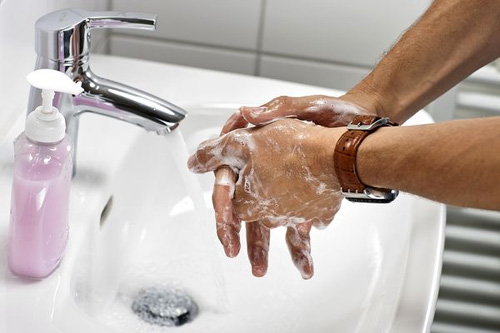天气一变冷似乎特别容易感冒,于是很多人开始考虑如何避免消灭细菌,但是用热水洗手并不会像你想的那样可以杀死细菌。
研究人员说,高温确实能够杀死细菌,但这种沸腾的高温是你无法忍受的。没有任何证据能够证明用热水(40-55°C)洗手能杀死细菌,而且长时间用热水洗手会破坏我们皮肤表面的保护层,使皮肤的抗菌能力降低。
研究人员说,你把手洗干净并且擦干,即使用4°C的水也能杀死细菌。
用热水洗手不仅没有必要,恰恰很浪费,特别是对环境来说。根据研究计算得出的数据,全美国每年8000亿次(热水)洗手加起来将产生600万吨二氧化碳的排放量。

It doesn’t kill germs better than cooler water, but turning tap temperatures high, the US burns carbon equal to the emissions of Barbados.
People typically wash their hands seven times a day in the United States, but they do it at a far higher temperature than is necessary to kill germs, a new study says. The energy waste is equivalent to the fuel use of a small country.
It's cold and flu season, when many people are concerned about avoiding germs. But forget what you think you know about hand washing, say researchers at Vanderbilt University. Chances are good that how you clean up is not helping you stay healthy; it is helping to make the planet sick.
Amanda R. Carrico, a research assistant professor at the Vanderbilt Institute for Energy and Environment in Tennessee, told National Geographic that hand washing is often "a case where people act in ways that they think are in their best interest, but they in fact have inaccurate beliefs or outdated perceptions."
Carrico said, "It's certainly true that heat kills bacteria, but if you were going to use hot water to kill them it would have to be way too hot for you to tolerate."
She explained that boiling water, 212°F (99.98°C), is sometimes used to kill germs - for example, to disinfect drinking water that might be contaminated with pathogens. But "hot" water for hand washing is generally within 104°F to 131°F (40°C to 55°C.) At the high end of that range, heat could kill some pathogens, but the sustained contact that would be required would scald the skin.
Carrico said that after a review of the scientific literature, her team found "no evidence that using hot water that a person could stand would have any benefit in killing bacteria." Even water as cold as 40°F (4.4°C) appeared to reduce bacteria as well as hotter water, if hands were scrubbed, rinsed, and dried properly.
In fact, she noted that hot water can often have an adverse effect on hygiene. "Warmer water can irritate the skin and affect the protective layer on the outside, which can cause it to be less resistant to bacteria," said Carrico.
Using hot water to wash hands is therefore unnecessary, as well as wasteful, Carrico said, particularly when it comes to the environment. According to her research, people use warm or hot water 64 percent of the time when they wash their hands. Using that number, Carrico's team calculated a significant impact on the planet.
"Although the choice of water temperature during a single hand wash may appear trivial, when multiplied by the nearly 800 billion hand washes performed by Americans each year, this practice results in more than 6 million metric tons of CO2 equivalent emissions annually," she said.
That's roughly equal to the emissions of two coal-fired power plants, or 1,250,000 passenger vehicles, over the course of a year. It's higher than the greenhouse gas emissions of small countries like El Salvador or Armenia, and is about equivalent to the emissions of Barbados. If all US citizens washed their hands in cooler water, it would be like eliminating the energy-related carbon emissions of 299,700 US homes, or the total annual emissions from the US zinc or lead industries.
The researchers found that close to 70 percent of respondents said they believe that using hot water is more effective than warm, room temperature, or cold water, despite a lack of evidence backing that up, said Carrico. Her study noted research that showed a "strong cognitive connection" between water temperature and hygiene in both the United States and Western Europe, compared to other countries, like Japan, where hot water is associated more with comfort than with health.
The researchers published their results in the July 2013 issue of International Journal of Consumer Studies. They recommended washing with water that is at a "comfortable" temperature, which they noted may be warmer in cold months and cooler in hot ones.
(来源:National Geographic Daily News 编辑:丹妮)
